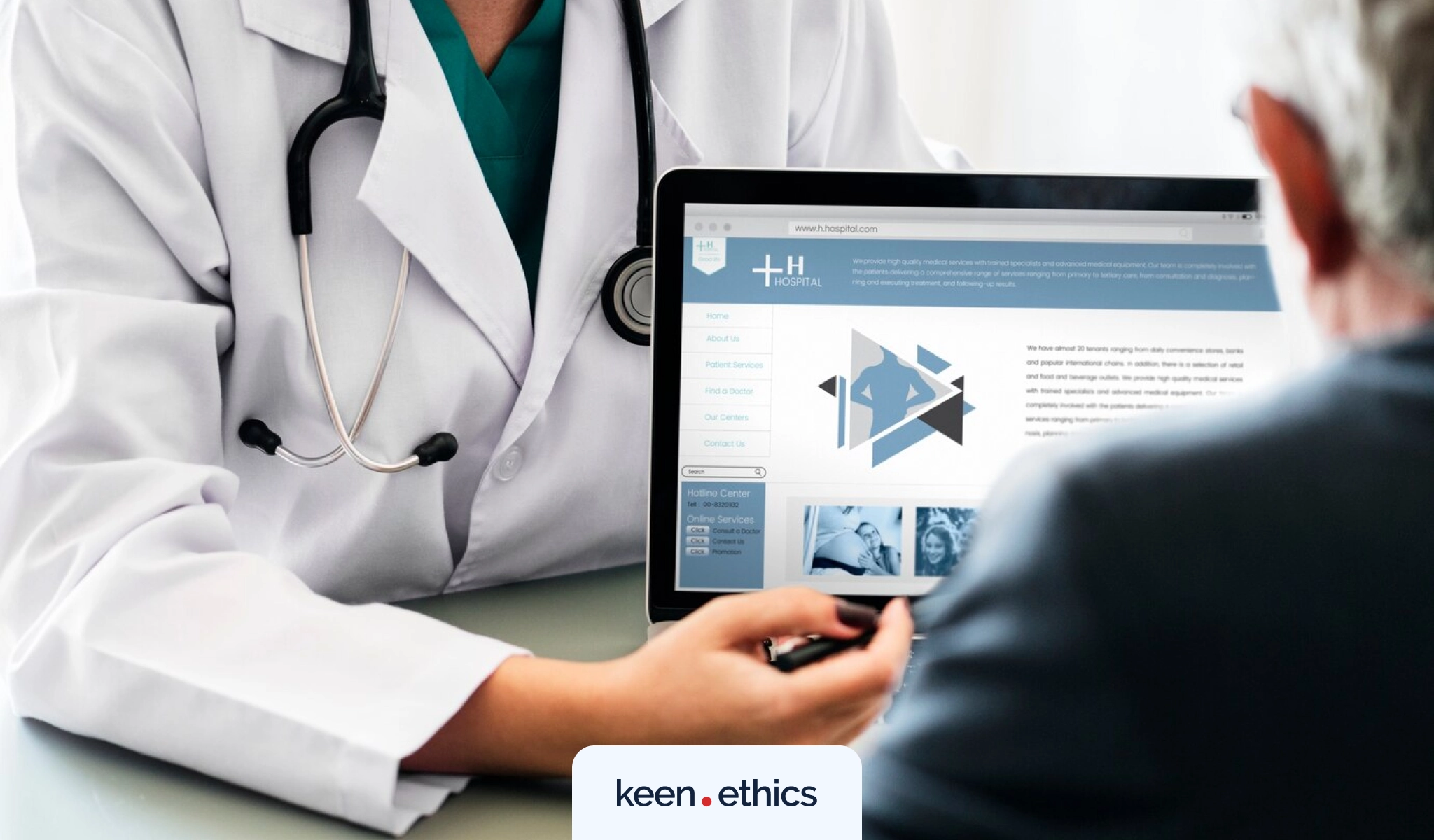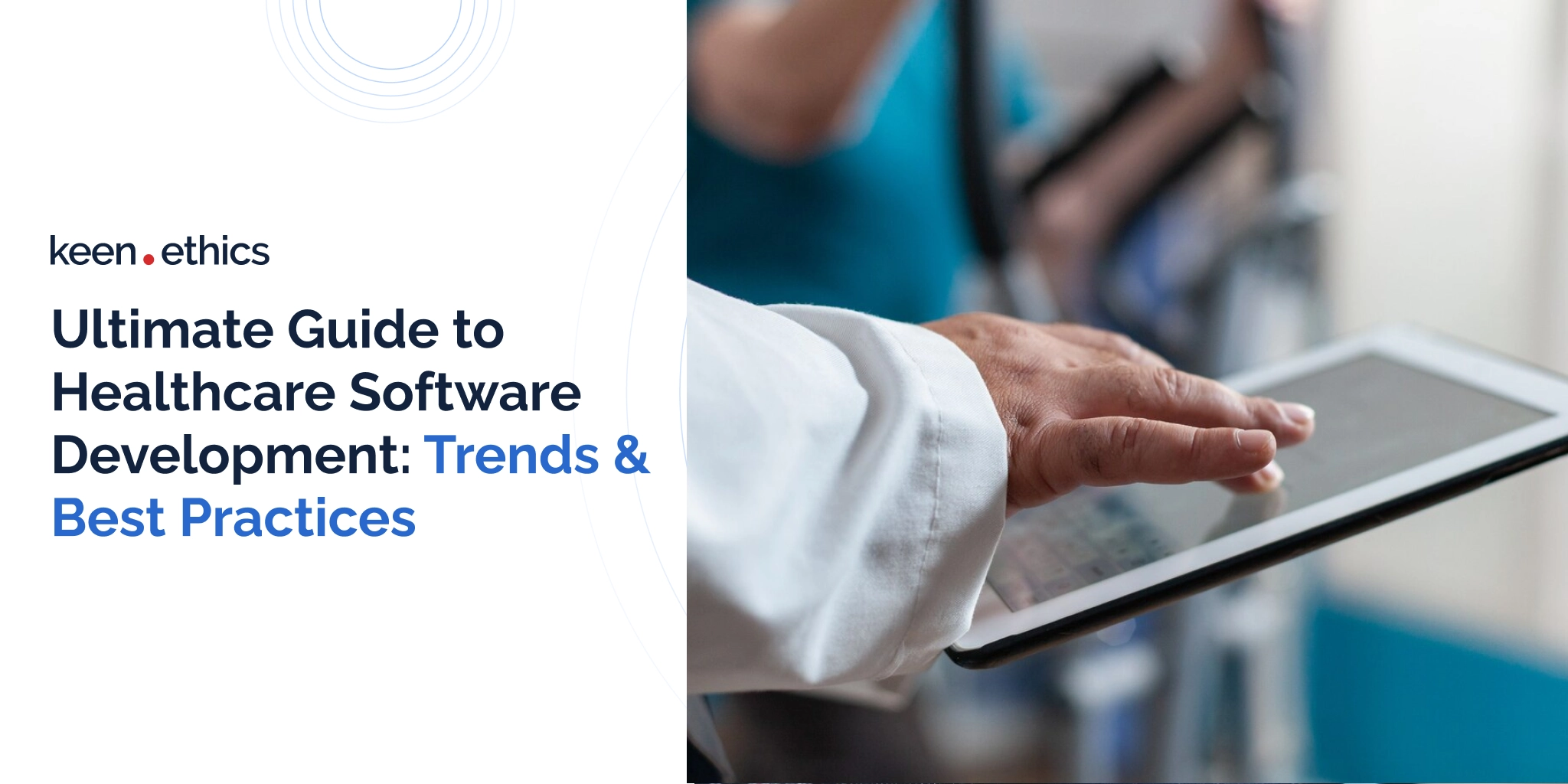Do you want to learn more about healthcare software development? In this detailed guide, we offer a full overview of this sphere.
The healthcare industry is undergoing a digital transformation, with healthcare software development playing a crucial role in enhancing patient care, optimizing workflows, and improving access to medical services. From electronic health records (EHR) to telemedicine platforms and AI-driven diagnostics, innovative software solutions are reshaping the way healthcare providers and patients interact. The benefits of healthcare software are extensive – it enhances efficiency, reduces errors, enables remote consultations, and streamlines data management. As the demand for advanced digital solutions continues to grow, businesses and healthcare institutions seek reliable partners to develop cutting-edge applications. In this article, we’ll explore the various types of healthcare software available today and how Keenethics can help bring your healthcare software project to life.
We have developed multiple services within the healthcare industry, assisting our customers with delivering products aimed at mental and physical health improvements. In this regard, we leverage healthcare expertise and our knowledge of manufacturing, agriculture, education, and real estate to bring the most robust solutions to the market. If modified appropriately, many technological principles of those fields can lead to positive healthcare technology outcomes.
What is Healthcare Software Development?

Healthcare software development is, as its title suggests, the creation of software for the healthcare sector. Today, it can take two very different forms. On the one hand, many firms in the healthcare market tend to invest significantly in off-the-shelf software. Certain companies develop this software to sell it to numerous customers. Aimed at the general market, these solutions typically share a wide range of capabilities. Yes, they remove the need for hospitals and other healthcare organizations to invest money into developing products. But, due to their general nature, they may lack some vital features or simply be overloaded with the sheer amount of available capabilities.
On the other hand, custom healthcare software development is also an option in the present markets. In this case, a product is not developed for the general market but according to a pre-planned set of requirements from a particular organization. Let’s imagine that a hospital needs a system for time management due to the growing workload of their nurses. They may propose some innovative techniques based on the latest findings in nursing literature, which indicate that many nurses spend at least 10% of their time on administrative tasks that can be performed by other specialists or, for example, AI.
In this case, they can address a firm like Keenethics to deliver a solution capable of making those techniques easy to use (for example, AI-based tools for prioritization). This software would be unique to a particular hospital and, as a result, allow it to enjoy benefits specific to its needs and internal culture.
Importance of Software Development in the Healthcare Industry
Considering the information above, software development is among the most essential activities for the modern healthcare industry.
Firstly, healthcare apps can improve the purely organizational aspects of healthcare, which often play a significant role in care availability. The software development market already provides high-quality tools for managing nurse and doctor shifts, represented by apps such as Zoho Shifts, Noterro, Sling, ShiftCare, EasyShifts, and QGenda. Moreover, researchers now propose projects for custom software development that would allow incorporating AI assistants into triage and medication administration (while there are still many ethical questions to be resolved here, current academic and professional consensus indicates quite optimistic views).
Secondly, a significant reason to develop healthcare software is the ability to improve hospital diagnosis quality. Modern academic research indicates that tools like machine learning, artificial intelligence, and even simple data collection frameworks that allow centralizing all findings in one place significantly boost the quality and speed of diagnosis for certain diseases. Current research indicates that AI, IoT (Internet of Things), and mobile technologies can be used in diabetic eye disease screening, hypertension monitoring and prevention, and even mental health diagnosis and treatment processes.
Software development is already bringing about a revolution in healthcare through mobile technology and IoT. With AI, this revolution will become even more expansive, significantly accelerating the decision-making processes among doctors and nurses.
Main Types of Healthcare Software

Currently, multiple types of healthcare software can be developed by a custom development firm or a product-oriented company that delivers off-the-shelf solutions. Let’s examine the existing solutions and analyze how they can help modern healthcare organizations.
EHR Solutions
Administration tasks aren’t among the most time-consuming for doctors and nurses, but they take away enough time to significantly lower the quality of available care. Companies developing software offer robust solutions to this long-term problem through Electronic Health Record (EHR) Software. EHR solutions help record, store, categorize, and quickly find all information about patient cases safely and securely. Solutions like Praxis EMR, Epic, Oracle Cerner, CPSI, and Athenahealth represent them.
Apart from off-the-shelf, pre-made solutions, it is also possible to create custom EHRs that target the specific needs of particular hospitals and practices. For example, innovative CBT methods in mental health treatments may call for an updated approach to patient records unavailable within traditional systems. In such cases, it may be a good idea to address healthcare software development firms like ours.
Prescription Management Software
Many types of medication are prescription-based, being under strict government control. For this reason, it is highly vital for hospitals and other healthcare organizations to thoroughly supervise the process of providing those medications, as their incorrect administration can have negative long-term consequences.
With paper-based systems, the possibility of error is typically relatively high. It’s easy to lose some documents and, as a result, either fail to provide medications or even give the wrong medicines because there are no in-built controls in those frameworks. As a result, they’re prone to errors that arise from fatigue and insufficient training.
What is a solution offered by leading experts in the field? They recommend focusing on e-prescribing software, as it has many fail-safe checks that prevent long-term adverse outcomes for all stakeholders. The best way to obtain such healthcare software is to find a development partner if your organization functions in a zone with unique legislation. An alternative is to find a more general software solution like ModuleMD and TherapyNotes if you work in a more standardized environment.
Software for Urgent Care
In 2021, there were almost 140 million visits to emergency care departments within the United States, according to the National Center for Health Statistics. This information shows that urgent care is likely among modern medical systems’ most significant and essential aspects. A typical problem encountered by experts in emergency departments is the heightened possibility of errors due to overcrowding, further exacerbated by personnel shortages.
Modern software can help with those issues by offering better time management and triage tools like TriageLogic’s myTriageChecklist and Keona Health. Moreover, the rise of AI and increasing knowledge about the development processes that make it more efficient enables the creation of custom digital solutions that further automate the decision-making processes by, for example, warning nurses and doctors about potential mistakes in their decision-making.
Hospital Management Solutions
A significant part of positive long-term outcomes of healthcare stems from proper organization. It’s essential not only to have well-trained doctors and nurses but also to know how to direct their capabilities toward offering their clients the highest levels of utility. The existing research clearly shows that hospital management solutions are invaluable for improving patient safety, satisfaction, and well-being.
How can healthcare software development help with those aspects? Once again, through either off-the-shelf solutions like athenaOne, TimeTap, and Caspio or custom frameworks developed for the specific needs of particular hospitals. This technology empowers healthcare professionals by offering fast access to the most vital data and a set of time-saving tools for quick and efficient data entry.
Healthcare CRM Software
Customer Relationship Management is also a significant part of proper healthcare. A hospital that ensures high levels of customer satisfaction will likely receive more funding and, as a result, deliver a higher quality of care. For this reason, CRM software, somewhat counterintuitively, actually enhances healthcare. Apps that can collect this type of healthcare data include Salesforce Health Cloud, Zoho CRM for Healthcare, and Microsoft Dynamics 365 Healthcare. You can also address companies like ours, Keenethics, to create custom solutions for healthcare CRM based on experience in the healthcare industry and other fields, such as manufacturing and Human Resource Management.
Telemedicine Software
The COVID-19 pandemic of the early 2020s showcased the importance of investing in telemedicine software. In some situations, such as COVID-19 lockdowns, many people can’t visit hospitals and other healthcare organizations. As a result, an alternative framework for treatment has arisen in the form of telemedicine. This type of solution, represented on the market by options such as Mend, Doxy.me, and AMC Health, allows doctors and patients to discuss health-related questions efficiently through a high-quality and safe channel. Custom healthcare software development for this type of app is interesting because it allows adding features not yet present in off-the-shelf solutions like generative AI or consent forms specific to particular countries and types of healthcare facilities.
Systems for Managing Laboratory Information

Laboratories constitute a significant part of the hospital systems, the core of modern diagnostic systems. Off-the-shelf and custom healthcare software can help administrators and lab workers organize data and perform fundamental analysis. In this regard, our firm has experience in developing healthcare software solutions that are adjacent to this field. Thus, you can address us both for the Riskiest Assumption Tests, Minimum Viable Product development, and full-scale project development aimed at this data type.
Radiology Information Systems
Radiology is a field that revolutionized the healthcare industry in the 20th century. It enables a non-invasive analysis of processes in the human body, greatly enhancing the capabilities of doctors to diagnose certain conditions and provide personalized care.
What’s the core reason for using Radiology Information Systems today? Apart from offering high-quality tools for processing images, they can now include AI support systems. According to one of the studies in a high-ranking general literature review, AI in radiology can decrease time requirements for diagnosis by almost 80% (for example, from 11 days to 2-3).
For this reason, investments in custom software may be essential for covering the core healthcare needs of various patients. Many custom development firms are at the forefront of AI research and can offer some of the most advanced tools.
Pharmacy Management Software
Pharmacies represent a vital part of the current healthcare system by distributing the most crucial types of medication. What is the core problem faced by those organizations? Once again, it is the issue of errors: in many cases, pharmacists can make incorrect decisions due to fatigue or task overload. In these conditions, healthcare software development is among the most important frameworks for reducing the rate of errors.
Modern instruments based on advanced algorithms and even AI can give employees in this type of healthcare organization various tools for preventing mistakes. They include checklists, correlation calculators that compare the existing diagnoses for compatibility with provided medication, and probability prediction capabilities that target the medicines with the highest level of misalignment.
Health Information Exchange Solutions
Doctors often refer their patients to other specialists for additional diagnosis or even more appropriate treatment. This process creates the need for tools that enable a comfortable transfer of information between various healthcare platforms. While general off-the-shelf tools like Siemens Healthineers can perform this function, it usually requires a significant emphasis on customized tools. Different states and regions within certain countries have unique requirements for handling patient information.
In this light, Health Information Exchange tools can significantly benefit from custom development. Do you need this sort of software for your business? Keenethics can deliver Health Information Exchange systems because it has significant experience implementing both healthcare software and advanced logistics management solutions.
Financial Management Software for Healthcare
According to WorldBank, healthcare spending accounts for more than 10% of global GDP at this point. More importantly, developed countries indicate that this figure will grow further, as they spend an average of 13% of their GDP on this sector. In this light, healthcare professionals must also focus on achieving a high level of financial expertise, as they collectively control 10% of the global economy.
Once again, the healthcare financial sector is less adapted to off-the-shelf solutions than others. While many frameworks target the US, solutions that interact with other markets are far less common. For this reason, it may be a good idea to invest in healthcare software development with a custom software firm, such as Keenethics, to create a solution that seamlessly integrates into the financial frameworks of your country specifically.
AI-Powered Healthcare Software
We have mentioned AI on multiple occasions in this article, showing that it can have vital positive impacts on treating diabetes, improving mental health, decreasing nurse and doctor error rates, and accelerating the diagnostic process in fields such as radiology. Let’s look at this topic from a broader perspective now. What is the future of this technology? How will it impact healthcare providers?
A report prepared by FN Media Group projects that the AI-in-healthcare field will grow from $20.9 billion in 2024 to $148 billion in 2029. Mayo Clinic Press indicates that it will lower healthcare costs and significantly boost positive health outcomes for the general population, based on a report from the American National Academy of Medicine. In this light, if you start using healthcare software solutions sooner, your patients will benefit more in the long run. Our company, Keenethics, has significant experience integrating AI, so you can address us for consultations and development regarding this technology.
Wearable Health Device Integration
The wearable device market offers tremendous opportunities for healthcare monitoring. Modern wearable devices coupled with the right healthcare software can collect immense amounts of information about patient health, gathering data on heart rate, body temperature, stress levels, and even blood pressure.
Some functions are still in the making: experts indicate that the blood pressure measurements of the leading smartwatches are only moderately accurate for now. However, we can expect further technological improvements in hardware and software (AI-based). With these improvements, wearable devices will become all-pervasive, creating a major demand for healthcare software development. In this case, you can address Keenethics to gain a head start in the market that will offer massive benefits for clients worldwide.
Blockchain for Medical Data Security
Healthcare information is usually very sensitive and is subject to very strict healthcare regulations issued by various government agencies. In this light, the cost of error in this sector is simply too high: from an ethical standpoint, a leak of information on, for example, mental health can have devastating outcomes for some patients; from a financial one, regulation in the healthcare sector makes those errors simply unacceptable due to strict and massive fines.
Blockchain is a technology that can guarantee the safety of customer records. Firstly, an adequately configured blockchain network can make them fully decentralized and anonymous, minimizing the impacts of singular data breaches and preventing the identification of patients, according to the World Economic Forum. Secondly, records in blockchain systems are immutable, making any form of malignant data tampering impossible. Keenethics has experience in developing both blockchain and healthcare projects. Thus, you can address us to combine this experience within one solution aimed at maximal data security for healthcare.
Virtual Health Support Systems and Chatbots
Virtual Health Support Systems are essential in the world of rising labor shortages within the healthcare field. The World Health Organization expects a shortage of 11 million healthcare specialists globally by 2030. Healthcare specialists must become more efficient in healthcare-specific competencies and general management capabilities to solve this problem.
Modern Virtual Health Support Systems and Chatbots can offer significant assistance in this regard. A typical virtual assistant with chatbot capabilities can correctly assign appointments and answer the most common patient questions. In this way, chatbot and virtual assistant technology can improve the accessibility of healthcare services by reducing the administrative workload of the specialists within the field. Our company has advanced experience developing chatbot and virtual assistant solutions for healthcare and other fields, such as marketing. Hence, you can address us for healthcare software development services in this field.
What Are the Benefits of Healthcare Software?

The core benefits of healthcare software are quite diverse. We have already outlined some specific advantages of this technology in the section overviewing specific healthcare technologies. Now, let’s have a more general overview of the opportunities available on the market:
1. Cost Reduction
Healthcare software is known for reducing costs significantly. According to the American National Bureau of Economic Research report prepared by academics and McKinsey & Company experts, artificial intelligence, if adopted at a large scale in the US, will lead to between 5 and 10 percent savings in annual expenditures or approximately $200-360 billion optimization in 2019 dollars. Other types of healthcare software solutions, such as IoT integration, can make the savings rates even more impressive.
2. Error Reduction
Errors are inevitable in healthcare, and, as a team of researchers from major American medical university-based research centers indicates, they result in up to $1 trillion in losses yearly for the US alone. For this reason, even a 1% reduction in error rates within a healthcare system can significantly improve its financial status.
In reality, healthcare technology is much more powerful today: according to a review of the relevant literature performed by the European Health Management Association, AI and other similar technology in healthcare, for example, have a margin of error of 3% as opposed to 8 to 12% among humans. Ultimately, the full implementation of this technology can prevent 3.2 million days of hospitalization in the European Union alone. This reduction will stem purely from removing medical errors within the field.
3. Security Improvement
Another benefit of investments in healthcare software development is the ability to greatly improve patient information safety. Today, we live in a world of increasing cybercrime: more and more malignant actors are trying to steal user information. With technologies like blockchain management software, which are easy to implement within an adequately configured healthcare software development process, those risks can be minimized, allowing healthcare providers to enjoy the best benefits of healthcare technology without encountering the majority of its risks.
4. Patient-Provider Communication Upgrade
According to the Joint Commission, as reported by the HIPAA Journal, 80% of serious medical errors result from patient-provider communication problems. Modern healthcare tools can finally resolve this problem. They allow users convenient access to medical history and accelerate doctor response times through in-built algorithm or AI-driven scheduling frameworks. Telemedicine is another benefit of healthcare software development in this field. This technology allows physicians to assess patients in a much more flexible range of settings than before.
5. Regulatory Compliance Control
Considering the tremendous potential costs of errors in healthcare (up to $1 trillion per year in the US alone, as mentioned previously), the field is inevitably a subject of many government regulations. One must have flawless medical records and immaculate processes to pass government and private inspections. In this light, healthcare software solutions are essential because being integrated with other hospital management software, they enable managers to create elaborate checklists that minimize the risks of regulatory gaps by a significant degree.
Challenges in Healthcare Software Development
We also have to mention some vital challenges in healthcare software development that can undermine the implementation of custom software within this field.
Data Safety Concerns
There are significant concerns regarding data security and privacy in the medical software field. The HIPAA Journal indicates that 725 data breaches were identified in 2023 within the United States by the American Department of Health and Human Services (HHS) Office for Civil Rights (OCR). The concentration of user data within computer systems with high Internet access inevitably results in an elevated risk of information leakage. We at Keenethics recommend looking into healthcare software solutions that incorporate blockchain and quantum-proof encryption if you want to ensure the maximum security of your user data.
Interoperability Concerns
Another concern that may be problematic for many firms in the market is interoperability. The market has many solutions right now, many of which may be incompatible. As a result, the adoption of multiple diverse technologies can result in a less pronounced positive effect from implementing healthcare technology.
Healthcare software development firms like Keenethics know how to solve this problem. Firstly, we can adapt custom desktop and mobile healthcare apps to your organization’s software stack. Secondly and most importantly, you can ask us to create software that will bridge the gap between different systems, preventing the problem of interoperability concerns both for you and the various organizations with which you work regularly.
Regulation Compliance Concerns
Modern software helps with adhering to non-software regulations in healthcare. However, more and more countries are also adopting laws that enable specific requirements for healthcare organizations. This factor can significantly raise software development costs if your outsourcing partner has not integrated core healthcare standards into their processes. Our company, in turn, already has major experience in healthcare software development. As a result, we understand how to adapt to the divergent requirements of the healthcare market.
How to Choose a Healthcare Software Development Company?

If you want to choose a company capable of delivering high-quality software development for healthcare, we recommend focusing on the following characteristics:
- Presence of healthcare-specific products in their portfolio or, ideally, a general focus on healthcare-specific software solutions;
- General market presence of at least 5 years or a team of industry experts with proven track records if the general level of experience is lower;
- Overwhelmingly positive feedback from customers on platforms such as Clutch and TrustPilot;
- High speed of response to customer requests and a detail-oriented approach to handling all user concerns;
- A diverse range of competencies in the healthcare industry and, if possible, advanced knowledge of other fields, such as manufacturing, and high competence in cutting-edge technologies like AI, blockchain, and the Internet of Things.
What Are the Current Trends in Healthcare Software Development?
The current trends in healthcare software development indicate a significant transition towards the Internet of Things (in the form of wearable devices) and, more importantly, Artificial Intelligence and blockchain as data analysis and security technologies, respectively. An international team of researchers, who prepared a detailed article on those technologies in the Healthcare journal, reports that they offer tremendous opportunities for process improvement in healthcare. However, these technologies also create long-term dangers related to interoperability and data security, requiring innovative healthcare software solutions as well as new organizational and management approaches for mitigating those risks.
Future of Healthcare Software Development
The future of the healthcare software development field appears to be quite promising in the current conditions. Healthtech software sees major advances in almost every aspect, from telemedicine software to AI-based error prevention programs. In this light, we want to repeat the statistic offered by FN Media Group: the field of AI application in healthcare alone is on a growth trajectory that will push it from 21 billion US dollars (as of 2024) to 148 US dollars by 2029. Other fields will likely undergo more negligible growth but are likely to be propelled by the growing interest in technology and AI advancements. Without a doubt, the future of healthcare lies in the interaction of this field with software development.
Conclusion
To summarize, healthcare software development will likely have a tremendous long-term positive impact on all relevant market stakeholders. While healthtech has some drawbacks, such as increased security and interoperability concerns, they pale by comparison with enormous advantages like error reduction, increased diagnostic accuracy and speed, decreased doctor and nurse stress levels, and improved customer satisfaction rates.
If you want to work with a proactive development partner company that knows how to maximize the benefits of healthcare technology and minimize its associated risks, don’t hesitate to address our company, Keenethics. We have more than 9 years of experience in the development market and have completed more than 135 projects covering manufacturing, edtech, healthtech, HRtech, agriculture, finance, and real estate.
Keenethics is a proactive tech partner that can help you achieve this goal!

























